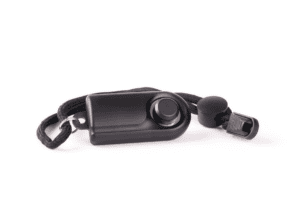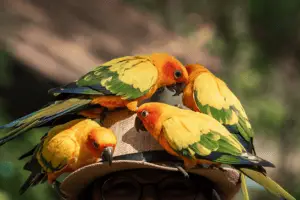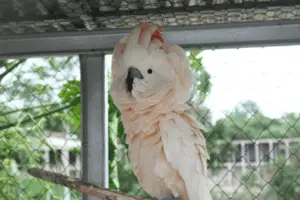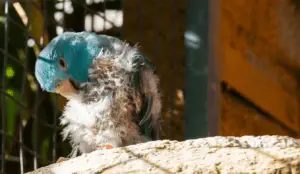Cockatiels are small beautiful creatures loved by most pet lovers worldwide. They have eye-catching color shades and patterns that help them attract their lovers instantly when mating. Cockatiels are sweet, cute, adorable, and cunning creatures who can learn to whistle and babble.
Therefore, if you’re a first-time cockatiel owner, you must wonder how long these beautiful creatures can live in captivity and the wild. After all, you want to spend the most time with your bird.
Key Takeaways
- Cockatiels live between 10 to 14 years in the wild and 16 to 25 years in captivity.
- But you can do many things for your pet to live for over two decades. Some of these things include proper diet, housing, and ensuring that it’s stress-free.
- A simple thing like perfume can affect the lifespan of every bird, including cockatiels.
- When adopting it, you should ensure it’s disease-free and has no behavioral issues.
Cockatiels have an average lifespan in captivity of between 16 and 25 Years, but sometimes it can be shorter. Some have lived to exceed 32 years. In the wild, they can live for 10 to 14 years, while the unlucky ones live for less than 10. Most chicks don’t reach adulthood in the wild.
Cockatiels are amazing creatures that can keep you company for over two decades when well-taken care of. The oldest Cockatiel in captivity lived for 32 years. In this guide, we’ll elaborate more on cockatiel lifespan in the wild and captivity. We’ll also show you what affects their lifespan and how you can improve it. So let’s dive right in.
Cockatiel Lifespan in the Wild
Cockatiels are beautiful creatures widely distributed all over the Australian mainland, but they prefer the coastlines to the inland regions. These birds congregate in areas with open land and fresh water. So you can find them in the open woodlands near freshwater bodies.
Therefore, under the right conditions, including plenty of food and water, these birds can live for an average of between 10 and 14 years in the wild. Unfortunately, these birds tend to live for even fewer years in the wild, thanks to several factors. It’s a known fact that most chicks rarely make it to adulthood. So here are a few factors that can affect the cockatiel lifespan in the wild:
Predation
Generally, Australian raptors are the primary predators of these beautiful creatures. They are preyed upon while feeding by these raptors. Unfortunately, their immediate protection from predators is that they are camouflaged and can easily blend with the ground when foraging. Besides their unique coloration and high-speed flight, they have no other natural defense against the raptors.
Therefore, they always respond to attacks using aerial evasion. They also use their shrill and loud vocals to warn the others. On top of that, they can also deliver some sharp bites when attacked. Unfortunately, this defense mechanism doesn’t work with young ones, so most young birds rarely reach adulthood.
Habitat Destruction
Another factor affecting most creatures’ lifespans, including cockatiels, is habitat destruction. Humans have been invading their habitats for years for natural resources and urbanization. Habitat destruction has resulted in most of these birds migrating, thanks to destroying their food supply.
Lack of food has resulted in the demise of most of these birds over the years. Plus, it has exposed them to predators since they no longer have places to hide in the wild. But the ones that have suffered the most are the young cockatiels who can’t protect themselves.
Illnesses

Like most parrots, including budgies, cockatiels are affected by a wide range of illnesses that can shorten their lifespan. Unfortunately, in the wild, no form of vaccination or treatment leaves them exposed to a wide range of bacteria. A great example is that they carry the Chlamydophila psittaci in their bodies without being affected.
They can shed these bacteria via respiratory tract secretions and stool and affect other birds. The other birds may have enlarged livers, weakness, and respiratory symptoms. Giardia also affects this bird, which can cause diarrhea, which may leave it itchy and attack its wings.
How Long Do Cockatiels Live In Captivity?
As you would have guessed, these birds do better in captivity than in the wild. Before discussing their lifespan and how you can improve it, we should stress that this bird’s life depends entirely on you. Therefore, you’re responsible for getting them to a respectable age.
They depend on the care you will provide, so you should be ready to research before adopting one. It would help if you learned how you would keep their lives exciting and help them learn more once they’re in your care.
According to Wikipedia, in captivity, they can live between 16 and 25 years, but some parrots live up to 32 years.
Can Cockatiels Live For 40 Years?
No, these birds cannot live for 40 years; they can live for about 32 years. But most of them rarely live beyond 25 years. According to the Guinness book of records, the oldest living Cockatiel was 32 in 2016. This Cockatiel is known as Sunshine, and it lives in New Mexico, US: Vickie Aranda, her owner.
Aranda purchased the parrot in 1983 and has been moving all over the country with it for over three decades.
Factors Contributing to Cockatiel Lifespan
Now that we have talked about the potential lifespan of a cockatiel, we need to find out how we can improve the lifespan of our pets. Generally, several factors can affect your Cockatiel’s health. Fortunately, several factors are within our control, while others are beyond our hands.
Some of the things that can affect their health are genetics, which you can’t do anything about. But if you research when adopting it and learn more about its parent’s medical history, you may avoid some bad traits and illnesses. So if you want to discover how to improve your pet’s lifespan, please read on.
Diet
Like humans, a proper diet is mandatory for keeping our pets healthy and happy. But we must approach their diet differently and avoid some of the myths associated with Cockatiel’s diet. For instance, the myth that they can thrive on dry seeds alone is pervasive.
The seeds are a huge part of their diet, but even the kind of seeds they consume differs from what we can find at the stores. The best seed mix for cockatiels shouldn’t consist of dry, partially sprouted, and fresh seeds.
You can feed your bird many grains, including berries and any other food they can find in the fields. Remember, they’re popular foragers found in areas in the wild. Therefore, they can even consume some unlucky insects they see on the ground.
Unfortunately, it’s practically impossible for these birds to survive only on seeds. Some of the older birds have survived on this diet. But, with a diet of less fatty food, they will likely live longer. Remember, their food doesn’t have to be calorie-rich like the ones in the wild because they use less energy.
Therefore, you must feed it a high-quality seed mix. You can also provide it with some specially formulated pellets. But ensure neither seeds nor pellets make up a considerable percentage of your pet’s dish. You can try and mimic its natural diet in the wild by including the following in its diet:
- Fresh fruits: these pets consume fresh fruit in the wild, so you should give them mango, berries, and apples, but in moderation. These fruits have high sugar levels, which can harm our pets if they consume them in huge quantities.
- Fresh veggies: leafy veggies are exceptional, but you should try and give it a wide range of vegetables.
- Sprouted seeds: As mentioned, you can include some fresh and sprouted bird seeds instead of dry ones in your diet. You can purchase these legumes and seed sprouts from the store or prepare them at home.
- Treats: treats can come in handy when trying to improve the cockatiel lifespan, especially when training them. They are great motivators, so you can give them honey seed sticks and millet.
- Mineral block: a mineral block is mandatory for parrots, particularly when breeding. So you can offer them a cuttlebone, which most parrot owners include in their cages.
- Extras: unsalted lentils, pasta, or rice can come in handy. You can also give it herbs, boiled eggs, garden weeds, and some wild grasses to guarantee your pet gets everything it needs to thrive.
Provided your pet consumes balanced food, you will never have to worry about various ailments, including obesity. But remember to give it more calcium during the breeding season, as it can help with the egg-making process.
Care

Other than a proper diet, there are other things you can keep in mind when taking care of your Cockatiel. A simple accident can significantly impact its health, plus it can be pretty sensitive to stress; therefore, you should be ready to do everything humanly possible to take care of your pet. Some of the things that can affect the Cockatiel’s lifespan include:
Obesity
Obesity is quite common among birds and can cause many health issues. Sure, in the wild, they need high-fat levels. But these birds can be pretty active in the fields; plus, the fatty acid can help with keeping them warm. But low exercise and high fatty food associated with parrots in captivity can result in parrot obesity.
Various foods can cause obesity; therefore, you should give your pet lots of veggies to ensure it’s not affected by obesity-related issues and liver diseases. And most importantly, get a large cage with lots of space for the pet to fly and play around. Remember, exercise is mandatory for the health of your pet.
Safety
We can’t stress this enough, but birds can be injured or killed in your home without proper preparation. A simple thing like an open window is unsafe for your bird. Conversely, a dangerous toy can end up injuring your pet. Therefore, you should do everything possible to keep your Cockatiel safe while in your home.
You should cockatiel-proof your home and scrutinize the safety of any toy before purchasing it for your pet. To be safe, you should have a first aid kit for treating your pet in case of an injury. Plus, several of the closest avian vets can also come in handy.
Stress
Another killer of parrots is stress; in fact, it is a slow killer that you might never notice. Therefore, you should be ready to spend some time every day with your pet. Socialization can help prevent stress. On top of that, you should guarantee your pet a relaxed life.
On top of socialization, you should ensure that no kids are teasing your bird when you’re not around. You can also keep it busy with some safe toys when you’re not around. Proper training, diet, and stress-free life can help keep your pet safe while guaranteeing it will live for over two decades.
Air Quality
Like every bird, cockatiels come with a sensitive respiratory system; therefore, they can be affected by fumes, perfumes, and air fresheners. Thus, the room where you place your cockatiel must be free of fumes at any time. Some culprits affecting your cockatiels include a non-stick pan known for producing dangerous fumes like candles.
Other things you should keep away from your pet include a wide range of perfumes.
Vet Checkups
Even if the breeder confirms that your pet is in excellent health and has received the necessary vaccines, it’s always a good idea to take your bird to the vet. The avian vet will help you create a medical record for your new parrot and even help you detect any form of illness that you may have missed when adopting it.
It would be best to have it examined once per year and when sick. You should call your vet as soon as you notice any illness. Plus, they are great at hiding things, including diseases. So regular vet visits can come in handy.
Getting a Cockatiel

Other than the above practices, your choice of a pet can also play a massive role in improving your pet’s lifespan. So whether you adopt it from a rescue, a breeder, or from a family friend, you should be ready to take care of your pet. But before bringing it home, you have to examine its medical history and determine whether it can be an excellent fit for your home.
Remember, the whole idea is getting a healthy pet from the start. A healthy pet will likely survive and thrive in your home for years. Don’t forget to discover if it has any behavioral issues or phobias. But before taking it to the vet, you should examine it for signs of illnesses. Some of the clear signs of a well-kept bird include:
- Bright eyes
- No runny discharge from its eyes and nostrils
- A friendly bird
- Vibrant and clean feathers
A little sneeze is normal for a cockatiel; after all, it is how it clears its respiratory system from dander and dust. After sneezing, it will produce a clear discharge that shouldn’t last. But if it sneezes constantly and lasts over a few days, there is a problem, and you must bring your cockatiel to the vet.
Conclusion
Cockatiels in the wild live a different life from the ones in captivity. Therefore, they also have different lifespans, with our pets living longer than their siblings in the wild. Technically, they can live for 10 to 14 years in the wild, while in captivity, they can reach a maximum of 25 years. However, some specific birds have lived up to 32 years old.
Fortunately, how you care for them will determine the Cockatiel’s lifespan. If you give it the proper diet and care and ensure it’s stress-free, your pet will keep you company for over two decades. But some factors beyond our control can shorten their lifespans, with some being genetics.
- Brandon Newmyer, et al, Nymphicus hollandicus, Cockatiel,https://animaldiversity.org/site/accounts/information/Nymphicus_hollandicus.html/ Accessed March 22, 2023
- Wikipedia contributors, Chlamydia psittaci,https://en.wikipedia.org/wiki/Chlamydia_psittaci/ Accessed March 22, 2023
- Wikipedia contributors, Cockatiel,https://en.wikipedia.org/wiki/Cockatiel#Life_span/ Accessed March 22, 2023
- Guinness World Record staff, Oldest Cockatiel living,https://www.guinnessworldrecords.com/world-records/oldest-cockatiel/ Accessed March 22, 2023
- The ultimate guide to parrots,https://www.google.co.ke/books/edition/The_Ultimate_Parrot_Training_Secrets/2Qhg10kalmcC?hl=en&gbpv=1&dq=obesity+among+parrots&pg=PT48&printsec=frontcover/ Accessed March 22, 2023
- CDC staff, Birds kept as pets,https://www.cdc.gov/healthypets/pets/birds.html/ Accessed March 22, 2023










